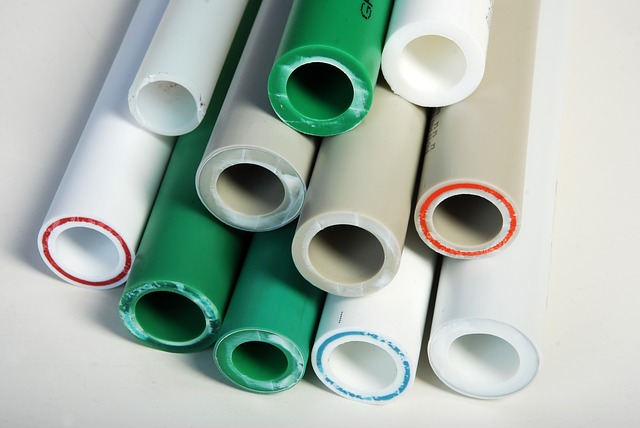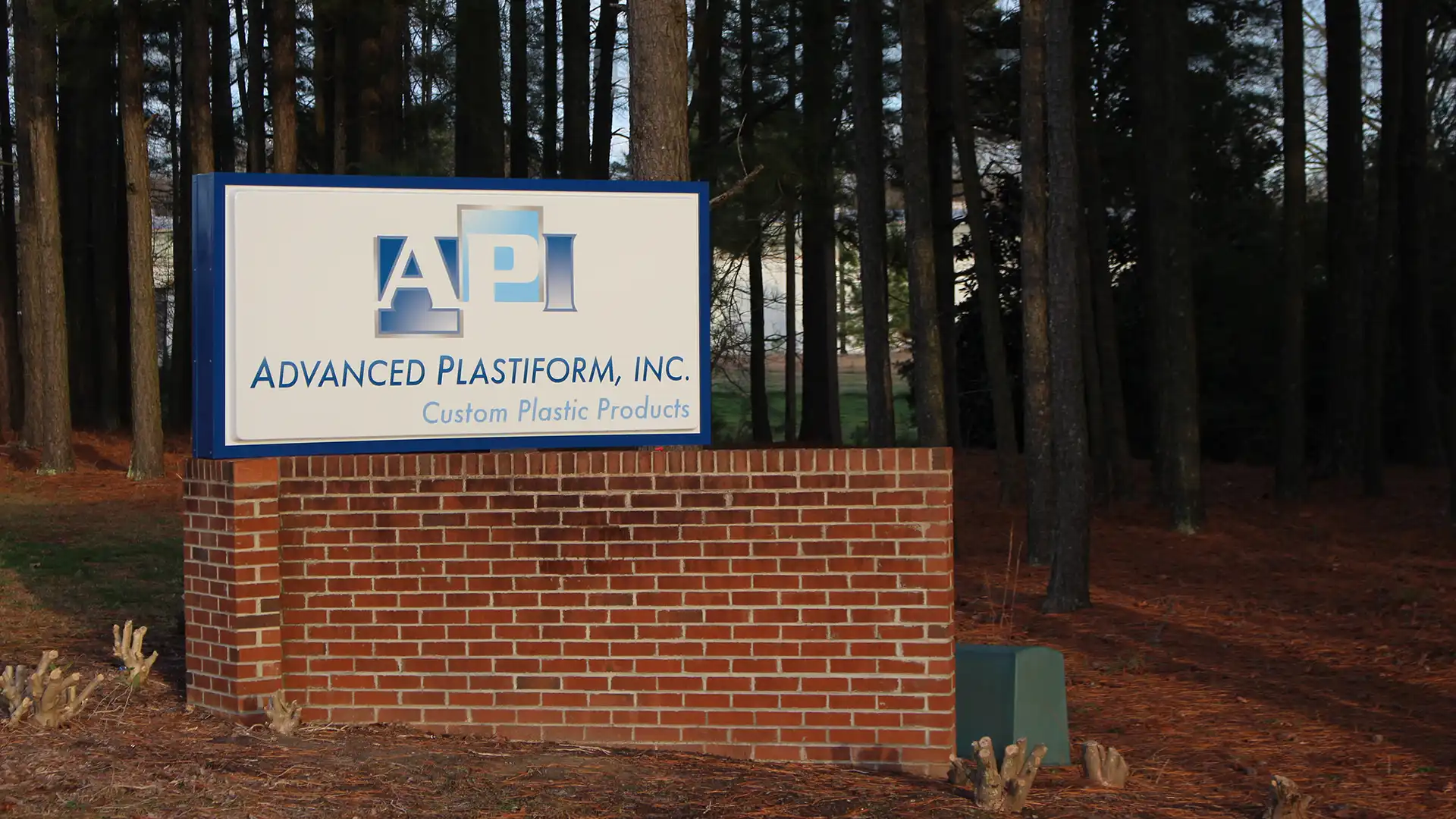Learn about polystyrene, a commonly used plastic that has wider uses than most people realize.
ABS or PVC for Plumbing Pipe Manufacturing
While lead pipes were once the standard material used in plumbing pipes, they were outlawed in 1986 due to concerns of corrosion that would expose people to dangerous lead particles. Once banned, they were quickly replaced by plastic pipes that were safer and more practical, due to their lower cost and lighter weight. Typically, pipes are made from ABS or PVC for plumbing, but which material is better?
To help you choose the best thermoplastic for your plumbing pipes, our thermoforming company in North Carolina is taking an in-depth look at both types of materials to help you make the right choice for your plastic parts projects.
What Is ABS?

Acrylonitrile Butadiene Styrene, or ABS, is a thermoplastic polymer used in a number of different applications for a variety of industries, from vehicle trunk tubs and dashboards to plumbing pipes and luggage. Polybutadiene dissolves in monomers of acrylonitrile and styrene, causing a chemical reaction that produces a linked molecule known as ABS.
Each chemical offers its own benefits:
- Butadiene offers impact resistance
- Acrylonitrile offers heat resistance
- Styrene improves the rigidity of the thermoplastic.
The result is a hard, opaque plastic that is very strong and rigid, resistant to temperature fluctuations, and inexpensive to source and manufacture.
Pros and Cons of ABS for Plumbing Pipes
ABS pipes are commonly used in plumbing and are easily identifiable by their black color. Let’s explore the advantages and challenges of using ABS in plumbing applications.
Benefits of ABS Pipes
- Temperature Resistant: ABS pipes perform well in both high and low temperatures, meaning they won’t crack in extreme cold or warp, bend, or melt in extreme heat.
- Impact Resistant: ABS is highly resistant to impacts, so it won’t crack or break during installation or if banged or knocked around.
- Durability: This hard, durable plastic can withstand both interior and exterior plumbing uses for decades with minimal issues.
- Easy to Shape: ABS is easy to form into all types of pipes, including curved ones for use under sinks or in tight spaces.
- Quick Installation: Connecting ABS pipes is a one-step process using special cement, which instantly bonds two pieces together.
- Easy to Cut: ABS is easier for plumbers to cut to size compared to other materials.
Challenges of ABS Pipes
- BPA Content: ABS contains bisphenol A (BPA), which makes the plastic harder. While the FDA has not found a direct risk to humans, some studies suggest potential hormonal and neurological effects on animals exposed to BPA.
- Building Code Restrictions: In some areas, local building codes do not permit ABS pipes to be used for freshwater plumbing.
- Cost: ABS pipes tend to be slightly more expensive than PVC pipes.
What Is PVC?
Polyvinyl chloride, or PVC, is a polymer of vinyl chloride and one of the most widely produced plastics in the world. Without the use of plasticizers or phthalates, PVC is a rigid, brittle material that is incredibly durable and resistant to water damage, abrasion, and chemical damage, and it's most often associated with pipes.
Pros and Cons of PVC for Plumbing Pipes
PVC is another popular material used in plumbing. Let’s break down the benefits and challenges of using PVC pipes.
Benefits of PVC Pipes
- BPA-Free: PVC is free of bisphenol A (BPA), making it a safer choice for many applications.
- Fewer Regulations: PVC pipes face fewer restrictions in local building codes compared to ABS, making them more widely accepted.
- Cost-Effective: The materials for PVC are inexpensive, which helps keep the overall cost of the final product low.
- Noise Reduction: PVC pipes muffle the sound of running water better than ABS, providing a quieter plumbing experience.
Challenges of PVC Pipes
- Slower Installation: Connecting PVC pipes is a more time-consuming process. Pipe ends must be primed, dried, and then bonded with special cement, which can take up to an hour to complete.
- Difficult to Cut: PVC is a hard and brittle material, making it more challenging to cut and resize as needed.
Choosing ABS or PVC for Plumbing Pipes
When selecting between ABS or PVC for plumbing pipes, both materials offer excellent performance. Our customers often have a number of frequently asked questions about Acrylonitrile Butadiene Styrene and Polyvinyl Chloride, and we hope to provide you with the insights you need to make an informed decision.
Each material has specific characteristics that may make one a better fit than the other depending on your needs. Let’s break down the differences to help you decide.
Building Code Requirements
One of the first things to consider is your local building codes. In some areas, ABS pipes may face more regulations, particularly for freshwater use, as certain building codes don’t permit ABS in these applications. On the other hand, PVC generally faces fewer regulatory restrictions, making it more widely accepted for both residential and commercial plumbing.
Safety and BPA Concerns
Both materials are considered safe for plumbing, but there is a notable difference in their chemical makeup. ABS contains bisphenol A (BPA), a compound used to harden the plastic. While there is no proven risk to humans, some consumers may have concerns due to studies that suggest BPA exposure could affect animals. In contrast, PVC is BPA-free, making it the preferred choice for those who want to avoid potential chemical concerns, especially in drinking water systems.
Cost Comparison
Pricing can play a significant role in decision-making, and ABS and PVC differ slightly in this regard. ABS pipes are typically a bit more expensive than PVC due to the inclusion of BPA and the manufacturing process. PVC, known for its affordability, is often the cheaper option, which can be especially appealing for large-scale projects where cost control is important.
Installation Process and Time
The installation process differs between ABS or PVC for plumbing pipes. ABS offers a quicker installation as the pipes connect using a one-step bonding method with special cement, allowing for fast assembly without additional preparation. On the other hand, PVC requires a more involved process. Pipe ends must be primed, dried, and then bonded with cement, which can take up to an hour to complete.
Durability and Impact Resistance
Both materials are durable, but they respond differently to impact and handling. ABS is more impact-resistant, making it less likely to crack or break during installation or under heavy stress. PVC, while durable, is more brittle than ABS, making it harder to cut and more prone to cracking under extreme force.
Temperature Performance
ABS performs exceptionally well in both high and low temperatures, making it a good choice for extreme climates. It won’t crack in freezing conditions or warp in extreme heat. PVC, while able to handle cold temperatures, is more prone to warping or melting in high-heat environments.
Noise Levels
An often-overlooked factor is the noise level of water moving through the pipes. ABS tends to transmit noise more easily, making the sound of running water louder. PVC provides better sound insulation, resulting in quieter plumbing systems, which can be a desirable feature in residential settings.
Why Choose Our Plastics Manufacturers for Plumbing Pipes?
At Advanced Plastiform, Inc., we specialize in providing high-quality, durable plastic solutions for plumbing applications. Our commitment to using advanced manufacturing techniques ensures that both ABS and PVC pipes are built to meet strict industry standards.
With a focus on longevity, impact resistance, and reliable performance in extreme temperatures, our ABS or PVC for plumbing pipes offer the ideal solution for both residential and commercial plumbing needs. Plus, we prioritize customer service and fast turnaround times to keep your projects on schedule.
Get a Free Quote for Custom Plastic Manufacturing Today
If you're in need of custom plastic pipes or other plastic plumbing materials, we offer high-quality, durable plastics at a low per-unit cost and a fast lead time. We offer thermoforming and injection molding to clients in the Southeast and Mid-Atlantic states, including North Carolina, South Carolina, Pennsylvania, Maryland, Tennessee, Georgia, and Virginia.
To learn more about our services for creating parts with ABS or PVC for plumbing, or to get a free quote, contact us today at 919-404-2080 or by filling out the form below.

